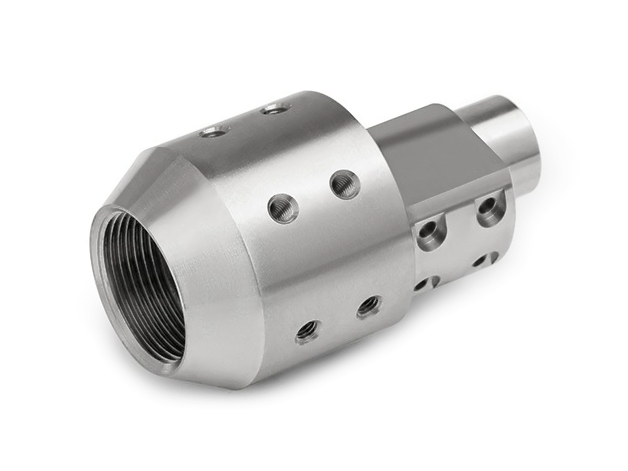Stainless Steel CNC Machining High-Precision Automation Systems Components
Introduction
In the highly specialized field of industrial automation, components must exhibit exceptional precision, durability, and reliability. Stainless steel, renowned for its robustness, corrosion resistance, and high strength, has become a material of choice for producing critical components in advanced automation systems. CNC machining, offering unparalleled precision and versatility, perfectly complements stainless steel, enabling manufacturers to craft intricate and highly durable parts essential for automated production lines and robotic assemblies.
Our company leverages state-of-the-art CNC machining capabilities to deliver precision-engineered stainless steel components tailored to automation systems. By utilizing advanced multi-axis machining technologies, we consistently achieve complex geometries and stringent tolerances, crucial for high-performance automated equipment. Our expertise ensures components meet exact specifications, significantly enhancing reliability, efficiency, and overall operational performance in automated industrial environments.
Available Machining Process
Our CNC machining processes optimized for stainless steel automation components include:
CNC Milling: Precision machining of intricate parts with complex features and tight tolerances.
CNC Turning: Producing high-quality cylindrical and symmetrical components.
Precision Drilling and Tapping: Ensuring precise hole alignment and threading for accurate assembly.
Multi-Axis CNC Machining (3, 4, and 5-Axis): Facilitates complex designs, minimizing machining setups, and enhancing accuracy.
CNC Grinding: Achieves ultra-precise finishes essential for high-performance applications.
Typical Stainless Steel in Automation
Several stainless steel grades dominate the automation industry:
Stainless Steel SUS304: Offers excellent machinability, corrosion resistance, and good strength.
Stainless Steel SUS316: Superior corrosion resistance, especially in chemical-intensive environments.
Stainless Steel SUS303: Noted for outstanding machinability, ideal for complex, high-precision components.
Stainless Steel SUS630 (17-4PH): Delivers high strength and corrosion resistance, ideal for critical automation components.
CNC Machinability of Stainless Steel
Stainless steel's machinability varies significantly depending on the alloy grade. Grades like 303 and 304 provide better machinability, reducing tooling wear and allowing efficient production. However, alloys like 316 and 17-4PH require specific machining parameters due to increased hardness and toughness, necessitating advanced tooling and expertise.
Considerations in Stainless Steel CNC Machining
Machining stainless steel requires specific considerations to ensure optimal outcomes:
Tool Selection: Carbide or ceramic tooling enhances precision and prolongs tool life.
Cutting Speeds and Feeds: Properly managing machining parameters prevents overheating and material deformation.
Coolant Usage: Essential to manage heat dissipation effectively, maintaining dimensional accuracy and surface finish.
Workpiece Stability: Ensuring secure clamping minimizes vibrations, improving surface finish and accuracy.
Common Surface Treatment
Typical surface treatments enhancing stainless steel automation components include:
Passivation: Enhances corrosion resistance, ensuring long-term durability.
Electropolishing: Achieves superior surface finish, reducing contamination risks in sensitive environments.
PVD Coatings: Improves wear resistance, significantly extending component lifespan.
Shot Peening: Increases fatigue resistance, enhancing component reliability under repetitive stresses.
Applications in Automation
Precision CNC machined stainless steel components are crucial in various automation applications, such as:
Robotic Arms and Grippers
Automated Assembly Systems
Conveyor System Components
Precision Bearings and Bushings
Sensor and Instrumentation Housings
For example, robotics systems extensively utilize precision stainless steel components for enhanced stability and reliability. Similarly, precision bearings and bushings made from stainless steel ensure consistent performance in high-speed industrial equipment, reducing downtime and maintenance costs.
Advantages and Limitations
Advantages:
Excellent durability and high strength.
Superior corrosion resistance is suitable for diverse environments.
High precision and repeatability enabled by CNC machining.
Low maintenance and prolonged service life.
Limitations:
Higher machining complexity and tooling costs.
Potential for work hardening, requiring expert machining practices.
Increased production costs relative to softer metals.
Conclusion
Integrating stainless steel CNC machining in automated industrial applications offers numerous advantages, including exceptional precision, durability, and reliability. Our advanced capabilities in CNC machining, combined with expert material selection and state-of-the-art surface treatments, ensure our customers receive high-performance components specifically tailored to meet stringent demands in automation systems.
By partnering with our CNC machining services, manufacturers in automation industries significantly enhance their productivity, reduce maintenance expenses, and increase system reliability and operational longevity.
FAQs
Why is stainless steel preferred for automation system components?
Which CNC machining techniques deliver optimal results for stainless steel?
How do surface treatments improve the performance of stainless steel components?
What challenges arise in CNC machining stainless steel for automation?
How do stainless steel alloys differ in their suitability for automation components?

